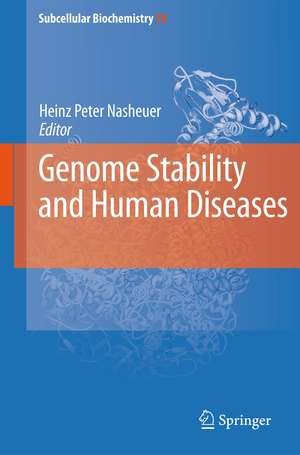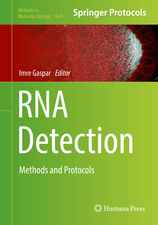Genome Stability and Human Diseases: Subcellular Biochemistry, cartea 50
Editat de Heinz-Peter Nasheueren Limba Engleză Paperback – mar 2012
This book is written by international leading scientists in the field of genome stability. Chapters are devoted to genome stability and anti-cancer drug targets, histone modifications, chromatin factors, DNA repair, apoptosis and many other key areas of research. The chapters give insights into the newest development of the genome stability and human diseases and bring the current understanding of the mechanisms leading to chromosome instability and their potential for clinical impact to the reader.
| Toate formatele și edițiile | Preț | Express |
|---|---|---|
| Paperback (1) | 1412.99 lei 6-8 săpt. | |
| SPRINGER NETHERLANDS – mar 2012 | 1412.99 lei 6-8 săpt. | |
| Hardback (1) | 1418.48 lei 6-8 săpt. | |
| SPRINGER NETHERLANDS – 18 dec 2009 | 1418.48 lei 6-8 săpt. |
Din seria Subcellular Biochemistry
- 18%
 Preț: 948.79 lei
Preț: 948.79 lei - 5%
 Preț: 1456.88 lei
Preț: 1456.88 lei - 18%
 Preț: 1373.84 lei
Preț: 1373.84 lei - 18%
 Preț: 1243.78 lei
Preț: 1243.78 lei - 18%
 Preț: 2098.81 lei
Preț: 2098.81 lei - 18%
 Preț: 1122.10 lei
Preț: 1122.10 lei - 5%
 Preț: 1160.63 lei
Preț: 1160.63 lei - 18%
 Preț: 1396.26 lei
Preț: 1396.26 lei - 18%
 Preț: 1114.96 lei
Preț: 1114.96 lei - 18%
 Preț: 1224.68 lei
Preț: 1224.68 lei - 18%
 Preț: 951.29 lei
Preț: 951.29 lei - 18%
 Preț: 1227.99 lei
Preț: 1227.99 lei -
 Preț: 398.15 lei
Preț: 398.15 lei -
 Preț: 399.88 lei
Preț: 399.88 lei - 18%
 Preț: 1231.47 lei
Preț: 1231.47 lei - 18%
 Preț: 1230.35 lei
Preț: 1230.35 lei -
 Preț: 392.60 lei
Preț: 392.60 lei - 18%
 Preț: 1231.47 lei
Preț: 1231.47 lei - 15%
 Preț: 638.76 lei
Preț: 638.76 lei - 5%
 Preț: 656.26 lei
Preț: 656.26 lei -
 Preț: 389.49 lei
Preț: 389.49 lei - 5%
 Preț: 659.19 lei
Preț: 659.19 lei -
 Preț: 392.37 lei
Preț: 392.37 lei - 5%
 Preț: 662.09 lei
Preț: 662.09 lei -
 Preț: 395.09 lei
Preț: 395.09 lei - 5%
 Preț: 667.99 lei
Preț: 667.99 lei -
 Preț: 400.47 lei
Preț: 400.47 lei - 18%
 Preț: 1224.54 lei
Preț: 1224.54 lei - 15%
 Preț: 647.73 lei
Preț: 647.73 lei - 15%
 Preț: 646.75 lei
Preț: 646.75 lei - 5%
 Preț: 662.30 lei
Preț: 662.30 lei -
 Preț: 395.25 lei
Preț: 395.25 lei - 18%
 Preț: 1230.21 lei
Preț: 1230.21 lei - 18%
 Preț: 1231.95 lei
Preț: 1231.95 lei - 18%
 Preț: 964.54 lei
Preț: 964.54 lei
Preț: 1412.99 lei
Preț vechi: 1487.36 lei
-5% Nou
Puncte Express: 2119
Preț estimativ în valută:
270.41€ • 293.62$ • 227.14£
270.41€ • 293.62$ • 227.14£
Carte tipărită la comandă
Livrare economică 22 aprilie-06 mai
Preluare comenzi: 021 569.72.76
Specificații
ISBN-13: 9789400731257
ISBN-10: 9400731256
Pagini: 356
Ilustrații: XVI, 340 p.
Dimensiuni: 155 x 235 x 19 mm
Greutate: 0.5 kg
Ediția:2010
Editura: SPRINGER NETHERLANDS
Colecția Springer
Seria Subcellular Biochemistry
Locul publicării:Dordrecht, Netherlands
ISBN-10: 9400731256
Pagini: 356
Ilustrații: XVI, 340 p.
Dimensiuni: 155 x 235 x 19 mm
Greutate: 0.5 kg
Ediția:2010
Editura: SPRINGER NETHERLANDS
Colecția Springer
Seria Subcellular Biochemistry
Locul publicării:Dordrecht, Netherlands
Public țintă
ResearchCuprins
Coming Full Circle: Cyclin-Dependent Kinases as Anti-cancer Drug Targets.- Core and Linker Histone Modifications Involved in the DNA Damage Response.- Chromatin Assembly and Signalling the End of DNA Repair Requires Acetylation of Histone H3 on Lysine 56.- Structure and Function of Histone H2AX.- The Initiation Step of Eukaryotic DNA Replication.- Non-coding RNAs: New Players in the Field of Eukaryotic DNA Replication.- Function of TopBP1 in Genome Stability.- Eukaryotic Single-Stranded DNA Binding Proteins: Central Factors in Genome Stability.- DNA Polymerases and Mutagenesis in Human Cancers.- DNA Polymerase ?, a Key Protein in Translesion Synthesis in Human Cells.- The Mitochondrial DNA Polymerase in Health and Disease.- Centromeres: Assembling and Propagating Epigenetic Function.- Nucleotide Excision Repair in Higher Eukaryotes: Mechanism of Primary Damage Recognition in Global Genome Repair.- Nonhomologous DNA End Joining (NHEJ) and Chromosomal Translocations in Humans.- Fluorescence-Based Quantification of Pathway-Specific DNA Double-Strand Break Repair Activities: A Powerful Method for the Analysis of Genome Destabilizing Mechanisms.- Apoptosis: A Way to Maintain Healthy Individuals.- The Use of Transgenic Mice in Cancer and Genome Stability Research.
Textul de pe ultima copertă
Since the establishment of the DNA structure researchers have been highly interested in the molecular basis of the inheritance of genes and of genetic disorders. Scientific investigations of the last two decades have shown that, in addition to oncogenic viruses and signalling pathways alterations, genomic instability is important in the development of cancer. This view is supported by the findings that aneuploidy, which results from chromosome instability, is one of the hallmarks of cancer cells. Chromosomal instability also underpins our fundamental principles of understanding tumourigenesis: It thought that cancer arises from the sequential acquisition of genetic alterations in specific genes. In this hypothesis, these rare genetic events represent rate-limiting ‘bottlenecks’ in the clonal evolution of a cancer, and pre-cancerous cells can evolve into neoplastic cells through the acquisition of somatic mutations.
This book is written by international leading scientists in the field of genome stability. Chapters are devoted to genome stability and anti-cancer drug targets, histone modifications, chromatin factors, DNA repair, apoptosis and many other key areas of research. The chapters give insights into the newest development of the genome stability and human diseases and bring the current understanding of the mechanisms leading to chromosome instability and their potential for clinical impact to the reader.
This book is written by international leading scientists in the field of genome stability. Chapters are devoted to genome stability and anti-cancer drug targets, histone modifications, chromatin factors, DNA repair, apoptosis and many other key areas of research. The chapters give insights into the newest development of the genome stability and human diseases and bring the current understanding of the mechanisms leading to chromosome instability and their potential for clinical impact to the reader.
Caracteristici
Discusses cancer cell biology in relation to Genome stability and Cell cycle regulation Unique assembly of experts in these fields who wrote a comprehensive and deep up-to-date overview Discusses models for the understanding of DNA damage-dependent signal transduction and regulation in human cells






















